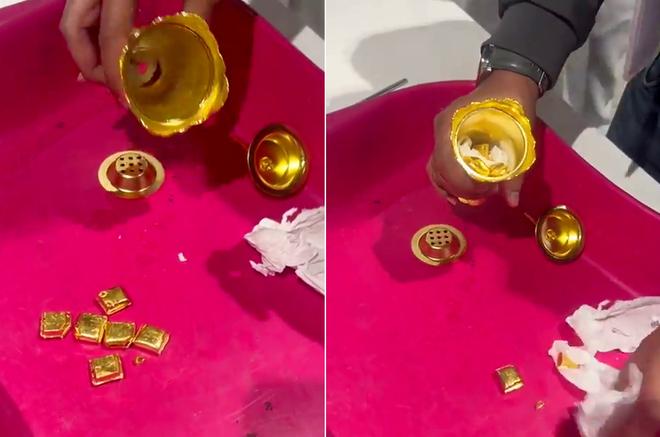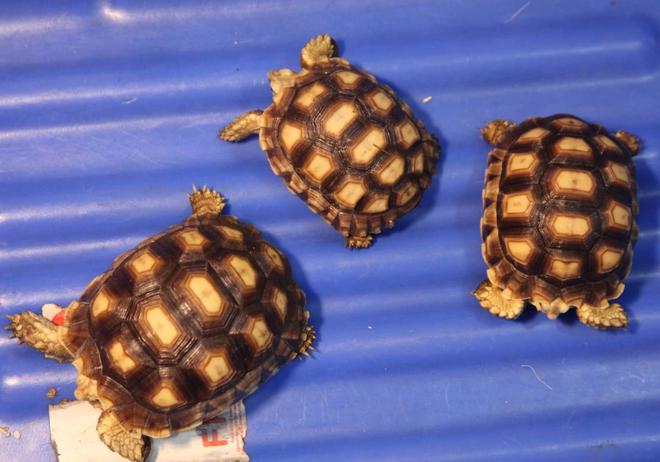Officials at the Kempegowda International Airport (KIA) in Bengaluru were intrigued by a 40-year-old Venezuelan passenger flying from Dubai (UAE) to Bengaluru on February 9. Throughout the journey, he refused to consume anything, including water. This raised red flags. He was detained and subjected to a medical examination. It turned out that the passenger had capsules containing 920 grams of cocaine in his belly. The drugs were worth ₹9.2 crore, one of the biggest seizures at the KIA in recent times.
The accused was a mule for an international drug racket. He was carrying the narcotics for his contact in New Delhi, officials from the Directorate of Revenue Intelligence (DRI) said.
On February 28, DRI officials arrested a 25-year-old man from Delhi who was carrying 1,498 grams of gold bars. Based on passenger profiling, officials zeroed in on the accused who was caught soon after he landed at the KIA from Dubai. The accused had gone to Dubai on a tourist visa. He returned to Bengaluru within a few days after getting an assignment as a mule. The accused had planned to take a flight from Bengaluru to Delhi.
In another case, Customs officials caught a Thai national flying in from Dubai on March 1, trying to smuggle 824.6 grams of gold paste worth ₹50.7 lakh, concealed within his body. The passenger was caught based on surveillance by field officers, and is suspected to be a mule for an international gold smuggling racket.
In February alone, DRI and Customs officials seized over 20 kg of gold being smuggled through the KIA. After Terminal 2 (T2) became operational on January 15, 2023, the KIA registered a 35% growth in passenger traffic in 2023 compared with the previous year, and served 3.72 crore passengers. The cases of smuggling of contraband, mainly narcotics and gold, have also gone up.
KIA as a landing point
The KIA has emerged as a “preferred landing point” for all kinds of contraband, including wildlife and wildlife artefacts, apart from narcotics and gold, heading to other cities, according to recent airport intel.

In another instance, KIA Customs unearthed a wild animal trafficking racket, arrested a 34-year-old man from Tamil Nadu flying in from Bangkok, Thailand, and rescued 234 wild animals — python, chameleon, iguana, turtles, alligators, and a dead baby kangaroo — in August 2023. The consignment was destined for Chennai.“This is a constant cat-and-mouse game, where we keep playing catch up and the smugglers try to evade us. The KIA was reporting several narcotics smuggling cases a few years ago. After we busted a series of narcotics cases, the landing point had shifted to Mumbai, and the cases had come down in Bengaluru. But after many smuggling attempts were foiled at both Delhi and Mumbai airports, the KIA has again emerged as a preferred landing point. We have heightened our vigil, which is reflected in the number of attempts to smuggle contraband we have been foiling,” a senior official posted at the KIA said.
Identifying mules is a challenge
The main challenge for Customs officials at the KIA has been identifying mules carrying contraband in their body as technology has been of little help in this regard. Even after identifying a suspected mule, officials have the Herculean task of convincing the mule to subject themselves to a medical examination, which is the only way the contraband in the body can be confirmed.
Mules are identified mostly through human intelligence — constant surveillance and profiling of passengers, and lookout for behavioural indicators that raise red flags. “Detection of mules is mostly a function of the expertise of field officers, often aided by leads from other agencies, their counterparts at other airports overseas, or from within the contraband trade,” a senior Customs official said.
Every person walking into or out of the airport is put under constant surveillance by field officers both physically and through CCTV cameras back in the control room apart from several electronic devices, like X-ray machines, baggage scanners, and metal detectors.

“Back in the control room, all officers are glued to their screens, but smugglers can slip through the cracks of the system in the blink of an eye. This is over and above the field officers, who profile passengers, apart from those who check passengers and their baggage,” explained a senior Customs official.
How they slip away
Though the airport is equipped with adequate surveillance, anti-sabotage, and contraband checking mechanisms, technology has some limitations, which is exploited by smugglers. For instance, the scanners detect solid gold and metal paste, but many times fail to detect gold in impure forms and contraband concealed in body parts, sources in the Surveillance Department of Customs said. This makes the expertise of field officers and human intelligence critical in identifying mules. The Customs and the DRI have designed a detailed SOP to identify suspected mules among a sea of passengers.
Officials look out for three broad categories of cues to identify mules — ticket characteristics, baggage characteristics, and behaviour of passengers, a senior Customs official said. The first red flag is ticket characteristics, given the officials also have a list of source countries from where mules usually come and the kind of passengers who act as mules, apart from suspicious ticket bookings.
For instance, a senior DRI official said that Dubai and other Gulf countries have always been the top countries from where “foreign origin gold” is smuggled in. These trends keep changing, the official said.
“For instance, earlier most mules for narcotics came from African nations,” the official said. Now, apart from some cases of South Americans working as mules, we have seen a big uptick in Southeast Asians being used as mules. We recently caught several individuals from Bangkok, Malaysia, Thailand, Indonesia, and Singapore working as mules to carry both narcotics and gold,” the official said.
In another emerging trend, smugglers are using couples with children, and men accompanying aged parents to smuggle contraband. Recently, officials at the KIA caught a couple travelling with minor children involved in gold smuggling. Smugglers also look for fresh faces with clean-slate backgrounds, officials said.
Many mules however, travel alone, book tickets at the last minute, sometimes buy them at the airport by paying cash, or through travel agencies flagged for being involved in the contraband trade. They change their itinerary and add passenger details at the last minute, citing fake call-back numbers. They often carry new bags that are tampered with; the bags often include a masking agent — something that emanates a pungent smell to avoid detection of narcotics, officials said.

Behaviour patterns of mules are also the biggest giveaway to an experienced observant eye, said a senior DRI official. They watch over their shoulders to check whether they are being followed, stare at the badge of a law enforcement officer to figure out whether they are a threat, and often do not leave the arrival area and look for their baggage to be offloaded, a senior official said.
The chief challenges
Despite all these measures, smuggling of contraband continues to thrive as mules often outsmart field officials with novel modus operandi. For instance, in February, Customs officials caught a passenger trying to smuggle gold powder concealed in a detergent pack. They burnt the packet to recover gold powder.
Also, after Terminal 2 became operational, there has been a surge in both passenger traffic and cargo to the extent that officials in charge of checking smuggling at the KIA feel overwhelmed, creating opportunities for criminal syndicates to exploit loopholes in the system, a senior official said.
“Though the traffic and cargo have increased tremendously with the opening of T2 at the KIA, DRI officials are managing somehow with the available resources, as they work on only specific operations based on intelligence inputs. However, Customs officials have a more elaborate mandate and are also facing a staff crunch. There is a need to not only augment their staff but also the technical equipment,” a senior official at the KIA said.
Tracking the chain
As most of the focus is on foiling smuggling attempts and recovering contraband at the airport, a majority of these cases are often not taken to their logical conclusion. “The passenger caught with contraband often doesn’t have information about the receiver. Mules are often asked to wait at the airport, and a receiver having all the details of the mule and their photograph will be waiting outside to collect the consignment. If the mule is caught and doesn’t emerge from the airport in 15-20 minutes after the plane’s arrival, the receiver slips away, cutting off the chain,” a senior official explained.
Some of these cases are transferred to agencies such as the Narcotics Control Bureau and the Directorate of Enforcement for further probe. But without a local link to the mule, there is little they can do.
“It is often only the mules, who are the dispensable elements in the smuggling operation, that are caught. Those running these rackets seem to have an endless supply of mules in several countries. Mules are often paid handsomely, apart from a foreign trip, food, and stay for a few days,” a senior official said.







